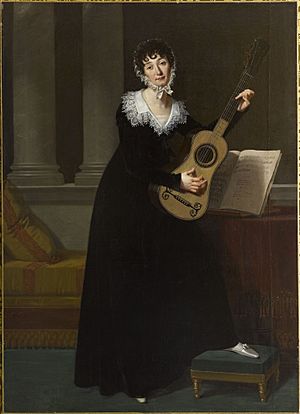Pauline Duchambge facts for kids

Pauline Duchambge (born de Montet, 1778 – April 23, 1858) was a talented French musician. She was a pianist, singer, and composer.
Contents
Life Story
Pauline Duchambge was born in Martinique. Her family was noble, meaning they had a high social rank. She moved to Paris, where she went to a convent school. There, she learned to play the piano from Jean-Baptiste Desormery. He was a composer and writer.
In 1792, Pauline left the convent. She married Baron Duchambge in 1796. By 1798, when she was 20, she faced tough times. She lost both her parents and her family's money. Soon after, she got divorced.
After these events, Pauline focused deeply on music. She studied music with famous composers. These included Daniel Auber and Luigi Cherubini. Cherubini even wrote some music just for her. She also learned piano and composition from Jan Ladislav Dussek.
In 1815, Duchambge met Marceline Desbordes-Valmore. Marceline was a French poet and writer. They became lifelong friends and worked together often. Their friendship is shown in many letters they wrote. Duchambge set many of Desbordes-Valmore's poems to music. Some of these songs include L'Adieu tout bas and La Fiancée del marin.
Pauline Duchambge wrote over 300 "romances." These were popular songs in the 1800s. Auber, her teacher, placed 300 of her songs in the Paris Conservatoire library. Many of her songs were published between 1827 and 1841. They were sold by big publishers in Paris. Her music also reached Germany. Besides songs, she wrote a few pieces for the piano.
Pauline Duchambge had a challenging life. She struggled with money problems and poor health. Her music often showed her feelings. She once said, "Love, it is life! but a life full of troubles, illusions, deceptions, repentance, discouragements…."
Musical Style
Duchambge's romances were very popular in the early 1800s. Many poets admired her work. She set poems by famous writers like François-René de Chateaubriand and Victor Hugo. She also used texts by women writers such as Mme. Amable Tastu.
Pauline often chose poems about nature and love. Her music usually had simple, clear melodies. These melodies were often decorated with small, quick notes. She also used different musical volumes. Duchambge was good at matching the music to the words. This helped show different feelings in a song.
Her music also had interesting harmonies. She used a variety of chords. She could change between major and minor keys in the same song. This helped show changing moods. The piano parts often used repeating patterns or broken chords. Sometimes the voice started right away. Other times, the piano played a short intro to set the mood. The end of the piano part often linked to the next verse. It also served as a final ending.
Works
Here are some of her known works:
- L'Ange gardien
- Le Matelot
- La Brigantine, ou le Départ
- Adieu donc mon pays! ou le Suisse au Régiment
- La Jalouse
Some of her music has been recorded on CDs, including:
- Songs of the Classical Age, audio CD, Label: Cedille
See also
 In Spanish: Pauline Duchambge para niños
In Spanish: Pauline Duchambge para niños
 | Emma Amos |
 | Edward Mitchell Bannister |
 | Larry D. Alexander |
 | Ernie Barnes |

